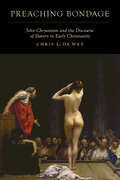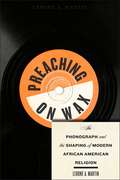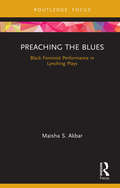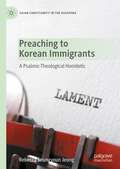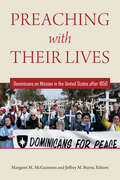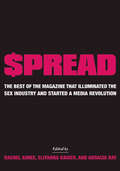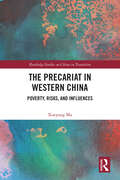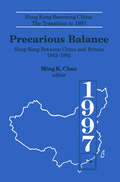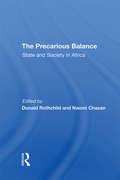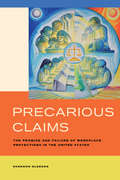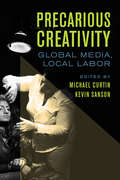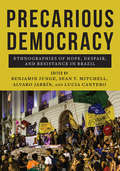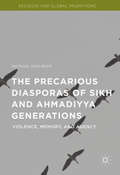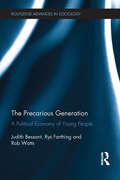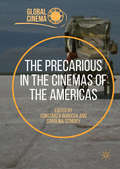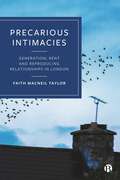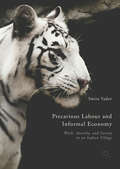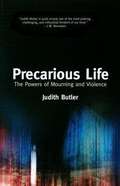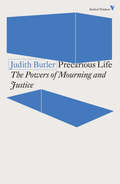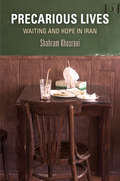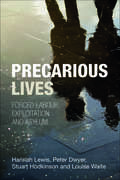- Table View
- List View
The Preacher's Wife: The Precarious Power of Evangelical Women Celebrities
by Kate BowlerFrom the New York Times bestselling author of Everything Happens for a Reason: And Other Lies I've Loved, a fascinating look at the world of Christian women celebritiesSince the 1970s, an important new figure has appeared on the center stage of American evangelicalism—the celebrity preacher's wife. Although most evangelical traditions bar women from ordained ministry, many women have carved out unofficial positions of power in their husbands' spiritual empires or their own ministries. The biggest stars—such as Beth Moore, Joyce Meyer, and Victoria Osteen—write bestselling books, grab high ratings on Christian television, and even preach. In this engaging book, Kate Bowler, an acclaimed historian of religion and the author of the bestselling memoir Everything Happens for a Reason: And Other Lies I've Loved, offers a sympathetic and revealing portrait of megachurch women celebrities, showing how they must balance the demands of celebrity culture and conservative, male-dominated faiths.Whether standing alone or next to their husbands, the leading women of megaministry play many parts: the preacher, the homemaker, the talent, the counselor, and the beauty. Boxed in by the high expectations of modern Christian womanhood, they follow and occasionally subvert the visible and invisible rules that govern the lives of evangelical women, earning handsome rewards or incurring harsh penalties. They must be pretty, but not immodest; exemplary, but not fake; vulnerable to sin, but not deviant. And black celebrity preachers' wives carry a special burden of respectability. But despite their influence and wealth, these women are denied the most important symbol of spiritual power—the pulpit.The story of women who most often started off as somebody's wife and ended up as everyone's almost-pastor, The Preacher's Wife is a compelling account of women's search for spiritual authority in the age of celebrity.
Preaching Bondage: John Chrysostom and the Discourse of Slavery in Early Christianity
by Chris L. de WetPreaching Bondage introduces and investigates the novel concept of doulology, the discourse of slavery, in the homilies of John Chrysostom, the late fourth-century priest and bishop. Chris L. de Wet examines the dynamics of enslavement in Chrysostom’s theology, virtue ethics, and biblical interpretation and shows that human bondage as a metaphorical and theological construct had a profound effect on the lives of institutional slaves. The highly corporeal and gendered discourse associated with slavery was necessarily central in Chrysostom’s discussions of the household, property, education, discipline, and sexuality. De Wet explores the impact of doulology in these contexts and disseminates the results in a new and highly anticipated language, bringing to light the more pervasive fissures between ancient Roman slaveholding and early Christianity. The corpus of Chrysostom’s public addresses provides much of the literary evidence for slavery in the fourth century, and De Wet’s convincing analysis is a groundbreaking contribution to studies of the social world in late antiquity.
Preaching on Wax: The Phonograph and the Shaping of Modern African American Religion (Religion, Race, and Ethnicity #5)
by Lerone A MartinThe overlooked African American religious history of the phonograph industry Winner of the 2015 Frank S. and Elizabeth D. Brewer Prize for outstanding scholarship in church history by a first-time author presented by the American Society of Church History Certificate of Merit, 2015 Award for Excellence in Historical Recorded Sound Research presented by the Association for Recorded Sound CollectionsFrom 1925 to 1941, approximately one hundred African American clergymen teamed up with leading record labels such as Columbia, Paramount, Victor-RCA to record and sell their sermons on wax. While white clerics of the era, such as Aimee Semple McPherson and Charles Fuller, became religious entrepreneurs and celebrities through their pioneering use of radio, black clergy were largely marginalized from radio. Instead, they relied on other means to get their message out, teaming up with corporate titans of the phonograph industry to package and distribute their old-time gospel messages across the country. Their nationally marketed folk sermons received an enthusiastic welcome by consumers, at times even outselling top billing jazz and blues artists such as Bessie Smith and Ma Rainey.These phonograph preachers significantly shaped the development of black religion during the interwar period, playing a crucial role in establishing the contemporary religious practices of commodification, broadcasting, and celebrity. Yet, the fame and reach of these nationwide media ministries came at a price, as phonograph preachers became subject to the principles of corporate America. In Preaching on Wax, Lerone A. Martin offers the first full-length account of the oft-overlooked religious history of the phonograph industry. He explains why a critical mass of African American ministers teamed up with the major phonograph labels of the day, how and why black consumers eagerly purchased their religious records, and how this phonograph religion significantly contributed to the shaping of modern African American Christianity. Instructor's Guide
Preaching the Blues: Black Feminist Performance in Lynching Plays (Routledge Advances in Theatre & Performance Studies)
by Maisha S. AkbarPreaching the Blues: Black Feminist Performance in Lynching Plays examines several lynching plays to foreground black women’s performances as non-normative subjects who challenge white supremacist ideology. Maisha S. Akbar re-maps the study of lynching drama by examining plays that are contingent upon race-based settings in black households versus white households. She also discusses performances of lynching plays at Historically Black Colleges and Universities (HBCUs) in the South and reviews lynching plays closely tied to black school campuses. By focusing on current examples and impacts of lynching plays in the public sphere, this book grounds this historical form of theatre in the present day with depth and relevance. Of interest to scholars and students of both general Theatre and Performance Studies, and of African American Theatre and Drama, Preaching the Blues foregrounds the importance of black feminist artists in lynching culture and interdisciplinary scholarship.
Preaching to Korean Immigrants: A Psalmic-Theological Homiletic (Asian Christianity in the Diaspora)
by Rebecca Seungyoun JeongIn terms of practical-theology’s critical reflection on marginalized people’s wounds in a wider society, this book investigates the question, “How to proclaim the good news in response to first-generation Korean immigrants’ contextual suffering in the United Sates?” To answer the question, the book starts with investigating Korean immigrant hearers’ contextual predicaments in a new land to point out emerging practical-theological issues in relation to the practice of preaching. In this book, the primary subjects are first-generation Korean immigrants, especially those who have relatively low socio-economic status and struggle with the purpose of their lives as immigrants, particularly those whose material dreams have been shattered.In order to proclaim the good news, this book proposes a more appropriate immigrant theology for/in the practice of preaching by reclaiming the priorities of God’s future in our lives and confirming God’s active identification with Korean immigrant congregations in the depths of their predicament. Such reconstructive work for immigrant theology arises in response to their existential hardships, marginality, ethnic discrimination, and relative powerlessness in life.While acknowledging both the possibilities and limits of the diverse forms of current Korean immigrant preaching, the book then offers a strategic proposal for a new homiletic theory, namely “a psalmic-theological homiletic.” This proposed homiletic is deeply rooted in the theology of the Psalms and their rhetorical movement. This re-envisioned mode of eschatological and prophetic preaching in times of difficulty recovers ancient Israel’s psalmic, rhetorical tradition that aims toward faith. Its theological-rhetorical strategy intends to both transform hearers’ habitus of living in faith and enhance their hope-filled life through communal anticipation of God’s coming future on the margins. Specifically, this proposed homiletic critically adopts key features from psalms of lament and their typical, fourfold theological-rhetorical movement (i.e., lament, retelling a story, confessional doxology, and obedient vow) as now core elements of a revised Korean-immigrant preaching practice.
Preaching with Their Lives: Dominicans on Mission in the United States after 1850
by Margaret M. McGuinness and Jeffrey M. BurnsThis volume tells the little-known story of the Dominican Family—priests, sisters, brothers, contemplative nuns, and lay people—and integrates it into the history of the United States. Starting after the Civil War, the book takes a thematic approach through twelve essays examining Dominican contributions to the making of the modern United States by exploring parish ministry, preaching, health care, education, social and economic justice, liturgical renewal and the arts, missionary outreach and contemplative prayer, ongoing internal formation and renewal, and models of sanctity. It charts the effects of the United States on Dominican life as well as the Dominican contribution to the larger U.S. history. When the country was engulfed by wave after wave of immigrants and cities experienced unchecked growth, Dominicans provided educational institutions; community, social, and religious centers; and health care and social services. When epidemic disease hit various locales, Dominicans responded with nursing care and spiritual sustenance. As the United States became more complex and social inequities appeared, Dominicans cried out for social and economic justice. Amidst the ugliness and social dislocation of modern society, Dominicans offered beauty through the liturgical arts, the fine arts, music, drama, and film, all designed to enrich the culture. Through it all, the Dominicans cultivated their own identity as well, undergoing regular self-examination and renewal.
$pread: The Best of the Magazine that Illuminated the Sex Industry and Started a Media Revolution
by Edited By Rachel Aimee, Eliyanna Kaiser and Audacia Ray&“A fascinating collection from a group of courageous women who created the first publication to explore sex work in a compelling and intelligent way.&” —Candida Royalle $pread, an Utne Award–winning magazine by and for sex workers, was independently published from 2005 to 2011. This collection features enduring essays about sex work around the world, first-person stories that range from deeply traumatic to totally hilarious, analysis of media and culture, and fantastic illustrations and photos produced just for the magazine. The book also features the previously untold story of $pread and how it has built a wider audience in its posthumous years. What started as a community tool and trade magazine for the sex industry quickly emerged as the essential guide for people curious about sex work, for independent magazine enthusiasts, and for labor and civil rights activists.
The Precariat in Western China: Poverty, Risks, and Influences (Routledge Studies on China in Transition)
by Xueyang MaThis book provides a comprehensive picture for understanding the experiences and dynamics of precarious workers’ in-work poverty in western China.The research presented in this book identifies the causes and the consequences of precarious employment and in-work poverty and analyses the stakeholders’ responses to the changes in the context of employment in China's socialist market economy. The book explains why precarious workers tend to remain outsiders to rapid socio-economic transformation and informs readers as to how people make choices, how those with different abilities adapt to the process of de-traditionalisation and how marketisation changes people’s lifestyles, value systems, policy designs.Detailing empirical investigations of the experience and dynamics of workers’ precarious life, this book will appeal to students and scholars of Chinese society, social policy and poverty.
Precarious Balance: Hong Kong Between China and Britain, 1842-1992 (Hong Kong Becoming China Ser. #Vol. 4)
by Ming K. Chan John D. YoungThis work closely considers the history and political importance of Hong Kong in the period 1842 to 1992.
The Precarious Balance: State And Society In Africa
by Donald Rothchild Naomi ChazanSince independence, the political institutions of many African states have undergone a process of consolidation and subsequent deterioration. Constrained by external economic dependency and an acute scarcity of economic and technical resources, state officials have demonstrated a diminished capacity to regulate their societies. Public policies are agreed upon but ineffectively implemented by the weak institutions of the state. Although scholars have analyzed the various facets of state-building in detail, little systematic attention has been given to the issue of the decline of the state and mechanisms to cope with state ineffectiveness in Africa. This book focuses especially on the character of the postcolonial state in Africa, the nature of and reasons for state deterioration, and the mechanisms and policies for coping with state malfunction. Scholars from Africa, the United States, Europe, and the Middle East combine a broad understanding of African political processes with expertise on specific regions. Their analytic and comparative perspective provides a comprehensive and timely treatment of this vital and heretofore neglected theme in African politics.
Precarious Claims: The Promise and Failure of Workplace Protections in the United States
by Shannon GleesonAt publication date, a free ebook version of this title will be available through Luminos, University of California Press's new open access publishing program. Visit www.luminosoa.org to learn more.Precarious Claims tells the human story behind the bureaucratic process of fighting for justice in the U.S. workplace. The global economy has fueled vast concentrations of wealth that have driven a demand for cheap and flexible labor. Workplace violations such as wage theft, unsafe work environments, and discrimination are widespread in low-wage industries such as retail, restaurants, hospitality, and domestic work, where jobs are often held by immigrants and other vulnerable workers. How and why do these workers, despite enormous barriers, come forward to seek justice, and what happens once they do? Based on extensive fieldwork in Northern California, Gleeson investigates the array of gatekeepers with whom workers must negotiate in the labor standards enforcement bureaucracy and, ultimately, the limited reach of formal legal protections. The author also tracks how workplace injustices--and the arduous process of contesting them--carry long-term effects on their everyday lives. Workers sometimes win, but their chances are precarious at best.
Precarious Creativity: Global Media, Local Labor
by Kevin Sanson Michael CurtinAt publication date, a free ebook version of this title will be available through Luminos, University of California Press's new open access publishing program. Visit www.luminosoa.org to learn more.Precarious Creativity examines the seismic changes confronting media workers in an age of globalization and corporate conglomeration. This pathbreaking anthology peeks behind the hype and supposed glamor of screen media industries to reveal the intensifying pressures and challenges confronting actors, editors, electricians, and others. The authors take on pressing conceptual and methodological issues while also providing insightful case studies of workplace dynamics regarding creativity, collaboration, exploitation, and cultural difference. Furthermore, it examines working conditions and organizing efforts on all six continents, offering broad-ranging and comprehensive analysis of contemporary screen media labor in such places as Lagos, Prague, Hollywood, and Hyderabad. The collection also examines labor conditions across a range of job categories that includes, for example, visual effects, production services, and adult entertainment. With contributions from such leading scholars as John Caldwell, Vicki Mayer, Herman Gray, and Tejaswini Ganti, Precarious Creativity offers timely critiques of media globalization while also intervening in broader debates about labor, creativity, and precarity.
Precarious Democracy: Ethnographies of Hope, Despair, and Resistance in Brazil
by Lila Moritz Schwarcz Benjamin Junge Jessica Jerome Isabela Kalil Rosana Pinheiro-Machado Lucia Mury Scalco Patricia De Pinho Sean T. Mitchell Karina Biondi John Collins Lucia Cantero David Rojas Andrezza Alves Olival Alexandre De Olival Falina Enriquez Moisés Kopper Sarah LeBaron Baeyer LaShandra Sullivan Carlos Eduardo Henning Alvaro Jarrin Melanie A. Medeiros Patrick McCormick Erika Schmitt James KaleBrazil changed drastically in the 21st century’s second decade. In 2010, the country’s outgoing president Lula left office with almost 90% approval. As the presidency passed to his Workers' Party successor, Dilma Rousseff, many across the world hailed Brazil as a model of progressive governance in the Global South. Yet, by 2019, those progressive gains were being dismantled as the far right-wing politician Jair Bolsonaro assumed the presidency of a bitterly divided country. Digging beneath this pendulum swing of policy and politics, and drawing on rich ethnographic portraits, Precarious Democracy shows how these transformations were made and experienced by Brazilians far from the halls of power. Bringing together powerful and intimate stories and portraits from Brazil's megacities to rural Amazonia, this volume demonstrates the necessity of ethnography for understanding social and political change, and provides crucial insights on one of the most epochal periods of change in Brazilian history.
The Precarious Diasporas of Sikh and Ahmadiyya Generations
by Michael NijhawanThis book examines the long-term effects of violence on the everyday cultural and religious practices of a younger generation of Ahmadis and Sikhs in Frankfurt, Germany and Toronto, Canada. Comparative in scope and the first to discuss contemporary articulations of Sikh and Ahmadiyya identities within a single frame of reference, the book assembles a significant range of empirical data gathered over ten years of ethnographic fieldwork. In its focus on precarious sites of identity formation, the volume engages with cutting-edge theories in the fields of critical diaspora studies, migration and refugee studies, religion, secularism, and politics. It presents a novel approach to the reading of Ahmadi and Sikh subjectivities in the current climate of anti-immigrant movements and suspicion against religious others. Michael Nijhawan also offers new insights into what animates emerging movements of the youth and their attempts to reclaim forms of the spiritual and political.
Precarious Eating: Narrating Environmental Harm in the Global South
by Ben Jamieson StanleyThe role of food and hunger in contemporary South African and Indian environmental writing From GMOs to vegetarianism and veganism, questions of what we should (and shouldn&’t) eat can be frequent sources of debate and disagreement. In Precarious Eating, Ben Jamieson Stanley asks how recentering global South representations of food might shift understandings of environmental precarity. Precarious Eating follows the lead of writers and thinkers in South Africa and India who are tracing the production and consumption of food, exploring ways to reconnect our narratives about climate change, global capitalism, and social justice. Taking up a diverse range of novels, films, scholar/activist writings, intellectual histories, and cookbooks, Stanley connects the ethics of eating to histories of empire and apartheid, uneven globalization, gender and sexuality, and global South experiences of climate change. They shift the lens of environmental humanities from climate-focused paradigms developed in the global North to food-focused environmental culture and activism in the South, addressing topics that range from foraging and farmer suicides to disordered eating and queer intimacy. By highlighting authors, activists, and environments of the global South, Precarious Eating joins with scholarship from postcolonial, decolonial, Indigenous, and Black studies to underscore how capitalism and empire shape our planetary environmental crisis. Retail e-book files for this title are screen-reader friendly with images accompanied by short alt text and/or extended descriptions.
The Precarious Generation: A Political Economy of Young People (Routledge Advances in Sociology)
by Rob Watts Judith Bessant Rys FarthingThis book draws on a wealth of evidence including young people’s own stories, to document how they are now faring in increasingly unequal societies like America, Britain, Australia, France and Spain. It points to systematic generational inequality as those born since 1980 become the first generation to have a lower standard of living than previous generations. While governments and experts typically explain this by referring to globalization, new technologies, or young people’s deficits, the authors of this book offer a new political economy of generations, which identifies the central role played by governments promoting neoliberal policies that exacerbate existing social inequalities based on age, ethnicity, gender and class. The book is a must read for social science students, human service workers and policy-makers and indeed for anyone interested in understanding the impact of government policy over the last 40 years on young people.
Precarious Hope: Migration and the Limits of Belonging in Turkey
by Ayse ParlaThere are more than 700,000 Bulgaristanlı migrants residing in Turkey. Immigrants from Bulgaria who are ethnically Turkish, they assume certain privileges because of these ethnic ties, yet access to citizenship remains dependent on the whims of those in power. Through vivid accounts of encounters with the police and state bureaucracy, of nostalgic memories of home and aspirations for a more secure life in Turkey, Precarious Hope explores the tensions between ethnic privilege and economic vulnerability and rethinks the limits of migrant belonging among those for whom it is intimated and promised—but never guaranteed. In contrast to the typical focus on despair, Ayşe Parla studies the hopefulness of migrants. Turkish immigration policies have worked in lockstep with national aspirations for ethnic, religious, and ideological conformity, offering Bulgaristanlı migrants an advantage over others. Their hope is the product of privilege and an act of dignity and perseverance. It is also a tool of the state, reproducing a migration regime that categorizes some as desirable and others as foreign and dispensable. Through the experiences of the Bulgaristanlı, Precarious Hope speaks to the global predicament in which increasing numbers of people are forced to manage both cultivation of hope and relentless anxiety within structures of inequality.
The Precarious in the Cinemas of the Americas (Global Cinema)
by Constanza Burucúa Carolina SitniskyHistorically, cinema in the Americas has been signed by a state of precariousness. Notwithstanding the growing accessibility to video and digital technologies, access to the material means of film production is still limited, affecting the spheres of production, distribution, and reception. Equally, questions about the precarious can be traced in cultural and archival policies, film legislations, as well as in thematic and aesthetic choices. While conventional definitions of the precarious have been associated with notions of scarcity and insecurity, this volume looks at precariousness from a non-monolithic angle, exploring its productivity and potential for original, critical approaches, with the aim of providing new readings to the variedly rich and complex cinemas of the Americas.
Precarious Intimacies: Generation, Rent and Reproducing Relationships in London
by Faith MacNeil TaylorIn a time of increasing social and economic inequality, this book illustrates the precarity experienced by millennials facing both rising rents and wage stagnation. Featuring the voices of those with lived experience of precarity in north-east London, MacNeil Taylor focuses on intimacy, reproduction and emotional labour. The book widens readers’ understanding of a middle-class ‘generation rent’ beyond those locked out of anticipated home ownership by considering both social and private renters. Situated in a feminist and queer theoretical framework, the book reveals the crucial role of British policy-making on housing, welfare, and immigration in exacerbating inter- and intra-generational inequality.
Precarious Japan
by Anne AllisonIn an era of irregular labor, nagging recession, nuclear contamination, and a shrinking population, Japan is facing precarious times. How the Japanese experience insecurity in their daily and social lives is the subject of Precarious Japan. Tacking between the structural conditions of socioeconomic life and the ways people are making do, or not, Anne Allison chronicles the loss of home affecting many Japanese, not only in the literal sense but also in the figurative sense of not belonging. Until the collapse of Japan's economic bubble in 1991, lifelong employment and a secure income were within reach of most Japanese men, enabling them to maintain their families in a comfortable middle-class lifestyle. Now, as fewer and fewer people are able to find full-time work, hope turns to hopelessness and security gives way to a pervasive unease. Yet some Japanese are getting by, partly by reconceiving notions of home, family, and togetherness.
Precarious Labour and Informal Economy: Work, Anarchy, and Society in an Indian Village
by Smita YadavAn empirical account of one of India’s largest indigenous populations, this book tells the story of the Gonds—who currently face displacement and governmental control of the region’s forests, which has crippled their economy. Rather than protesting and calling for state intervention, the Gonds have turned toward an informal economy: they not only engage with flexible forms of work, but also bargain for higher wages and experience agency and autonomy. Smita Yadav conceives of this withdrawal from the state in favour of precarious forms of work as an expression of anarchy by this marginalized population. Even as she provides rich detail of the Gonds’ unusual working lives, which integrate work, labour, and debt practices with ideologies of family and society, Yadav illustrates the strength required to maintain dignity when a welfare state has failed.
Precarious Life: The Powers of Mourning and Violence
by Judith ButlerFive essays by Butler (rhetoric and comparative literature, U. of California-Berkeley) respond to the conditions of heightened vulnerability and aggression that followed the events of September 11, 2001. They reflect on explanation and exoneration; violence, mourning, and politics; indefinite detention; charges of anti-Semitism; and a non-violent ethics based on an understanding of how easily human life is annulled.
Precarious Life: The Powers of Mourning and Violence
by Judith ButlerIn this profound appraisal of post-September 11, 2001 America, Judith Butler considers the conditions of heightened vulnerability and aggression that followed from the attack on the US, and US retaliation. Judith Butler critiques the use of violence that has emerged as a response to loss, and argues that the dislocation of first-world privilege offers instead a chance to imagine a world in which that violence might be minimized and in which interdependency becomes acknowledged as the basis for a global political community.Butler considers the means by which some lives become grief-worthy, while others are perceived as undeserving of grief or even incomprehensible as lives. She discusses the political implications of sovereignty in light of the prisoners in Guantanamo Bay. She argues against the anti-intellectual current of contemporary US patriotism and the power of censorship during times of war. Finally, she takes on the question of when and why anti-semitism is leveled as a charge against those who voice criticisms of the Israeli state. She counters that we have a responsibility to speak out against both Israeli injustices and anti-semitism, and argues against the rhetorical use of the charge of anti-semitism to quell public debate.In her most impassioned and personal book to date, Judith Butler responds to the current US policies to wage perpetual war, and calls for a deeper understanding of how mourning and violence might instead inspire solidarity and a quest form global justice.
Precarious Lives: Waiting and Hope in Iran
by Shahram KhosraviIn Precarious Lives, Shahram Khosravi attempts to reconcile the paradoxes of Iranians' everyday life in the first decade of the twenty-first century. On the one hand, multiple circumstances of precarity give rise to a sense of hopelessness, shared visions of a futureless tomorrow, widespread home(land)lessness, intense individualism, and a growth of incivilities. On the other, daydreaming and hope, as well as civility and solidarity in political protests, street carnivals, and social movements, continue to persist. Young Iranians describe themselves as being stuck in purposelessness and forced to endure endless waiting, and they are also aware that they are perceived as unproductive and a burden on their society. Despite the aspirations and inspiration they possess, they find themselves forced into petrifying social and spatial immobility. Uncertainty in the present, a seemingly futureless tomorrow: these are the circumstances that Khosravi explores in Precarious Lives.Creating an intricate and moving portrait of contemporary Iranian life, Khosravi weaves together individual stories, government reports, statistics, and cultural analysis of art and literature to depict how Iranians react to the experience of precarity and the possibility of hope. Drawing on extensive ethnographic engagement with youth in Tehran and Isfahan as well as with migrant workers in rural areas, Khosravi examines the complexities and contradictions of everyday life in Iran. Precarious Lives is a vital work of contemporary anthropology that serves as a testament to the shared hardship and hope of the Iranian people.
Precarious Lives: Forced Labour, Exploitation and Asylum
by Hannah Lewis Peter DwyerAvailable Open Access under CC-BY-NC-ND licence This ground breaking book presents the first evidence of forced labour among displaced migrants who seek refuge in the UK. Through a critical engagement with contemporary debates about precarity, unfreedom and socio-legal status, the book explores how asylum and forced labour are linked, and enmeshed in a broader picture of modern slavery produced through globalised working conditions. Drawing on original evidence generated in fieldwork with refugees and asylum seekers, this is important reading for students and academics in social policy, social geography, sociology, politics, refugee, labour and migration studies, and policy makers and practitioners working to support migrants and tackle forced labour.

